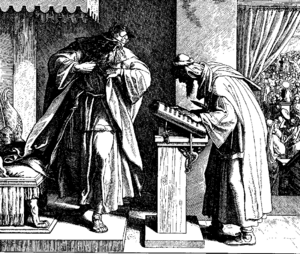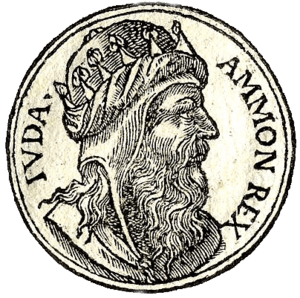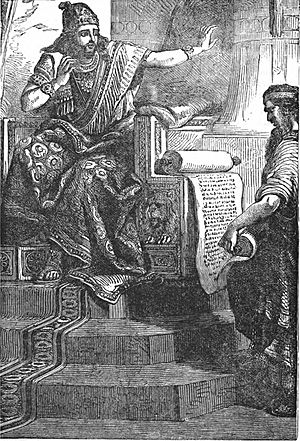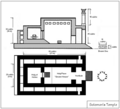Josiah facts for kids
Quick facts for kids Josiah |
|
|---|---|
| King of Judah | |
 |
|
| Reign | 640 to 609 BCE |
| Predecessor | Amon of Judah |
| Successor | Jehoahaz of Judah |
| Born | c. 648 BCE probably Jerusalem |
| Died | Tammuz (July/August) 609 BCE (aged 38–39) Jerusalem |
| Spouse | Zebudah Hamutal |
| Issue | Johanan Jehoiakim Jehoahaz Zedekiah |
| House | House of David |
| Father | Amon |
| Mother | Jedidah |
Josiah was an important king of Judah who lived in the 600s BCE. His name means "healed by Yah" or "supported by Yah," referring to God. According to the Hebrew Bible, Josiah made big changes to the religion in his kingdom. Many experts believe he helped create or collect important Hebrew Scriptures.
Josiah became king of Judah when he was only eight years old. This happened after his father, King Amon, was killed. Josiah ruled for 31 years, from about 641/640 to 610/609 BCE.
We only know about Josiah from the Bible. There are no other old writings from Egypt or Babylon that mention him. Also, no clear old objects with his name have been found. Still, most experts think he was a real person. They believe that few old documents from that time have survived. Also, Jerusalem has been rebuilt many times over thousands of years.
The Bible says Josiah was a very good king. It says he "walked in all the way of David his father." He is also one of the kings mentioned in the family tree of Jesus in Matthew's gospel.
Contents
Josiah's Family and Ancestors
The Hebrew Bible tells us that Josiah was the son of King Amon. His mother was Jedidah, who was the daughter of Adaiah from Bozkath.
Josiah's grandfather, Manasseh, was known for turning away from worshipping God. However, Josiah's great-grandfather was King Hezekiah, who was famous for making good changes to the religion.
Josiah had four sons. His son Shallum became king after him, known as Jehoahaz. Then, Eliakim became king, known as Jehoiakim. Jehoiakim's son, Jeconiah, ruled next. Finally, Mattanyahu became king, known as Zedekiah. Zedekiah was the last king of Judah before the kingdom was taken over by Babylon. Many people were then sent away during the Babylonian exile.
The Discovery of the Book of the Law
The Second Book of Chronicles says that Josiah was eight years old when he became king. When he was older, Josiah told the High Priest Hilkiah to use the money collected from taxes to fix up Solomon's Temple in Jerusalem.
While Hilkiah was cleaning out a room in the Temple, he found a special scroll. The Bible's Second Book of Kings calls it "the book of the Law."
Hilkiah then gave the scroll to his secretary, Shaphan. Shaphan took it to King Josiah. The Bible says that after reading it, King Josiah completely changed how he led his people. He made a new agreement with God. He got rid of all the false gods and their worship that had started in his land. He and his people promised to follow God's commands.
For a long time, in the 1800s and 1900s, many thought this "Book of the Law" was an early version of the Book of Deuteronomy. However, today some experts believe that Josiah's priests created this "Book of the Law." They might have done this to bring more power to Josiah and the Temple in Jerusalem.
Judah's Place in the World
When Josiah became king around 641/640 BCE, the world was changing. The Assyrian Empire was getting weaker. The Neo-Babylonian Empire had not yet become powerful. Egypt was also getting stronger after being ruled by Assyria. Because of this power gap, Jerusalem could rule itself without other countries interfering for a while.
In the spring of 609 BCE, Pharaoh Necho II of Egypt led a large army. He was going to the Euphrates River to help the Neo-Assyrian Empire. The Assyrians were losing battles against the Medes and the Neo-Babylonian Empire. Necho traveled along the coast route, the Via Maris, into Syria. He had a big army, mostly hired soldiers, and his ships helped him along the coast.
However, the Judean army, led by King Josiah, blocked his way. They were in the hills south of the Jezreel Valley. We don't know exactly why Josiah tried to stop the Egyptians. He might have thought that both the Assyrians and Egyptians were weaker. This was because Pharaoh Psamtik I had died just a year before. According to the Biblical Books of Chronicles, Necho did not want to fight the Judeans. He was confused by Josiah's attack. Necho supposedly sent a message saying, "What have we done to each other, king of Judah? I am not coming against you this day."
Josiah tried to stop the Egyptians at Megiddo. A fierce battle happened there, and Josiah was killed. Necho then joined forces with the Assyrian leader Ashur-uballit II. They crossed the Euphrates River to attack Harran. But their combined forces could not capture the city. Necho then went back to northern Syria.
How Josiah Died
The Bible has two different stories about how Josiah died. The Second Book of Kings simply says that Necho II met Josiah in battle at Megiddo and killed him. The Second Book of Chronicles gives a longer story. It says that Egyptian archers badly wounded Josiah. He was then brought back to Jerusalem to die.
Images for kids
-
View of the inner court and House of the Temple of Solomon as seen in a computer model.
-
A drawing of the Temple of Solomon based on descriptions in the Tanakh.
-
View of the Temple of Solomon with the roof removed, as seen in a computer model.
-
Pharaoh Necho II.
See also
 In Spanish: Josías de Judá para niños
In Spanish: Josías de Judá para niños
 | Dorothy Vaughan |
 | Charles Henry Turner |
 | Hildrus Poindexter |
 | Henry Cecil McBay |







